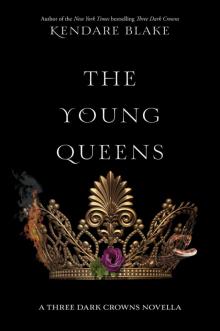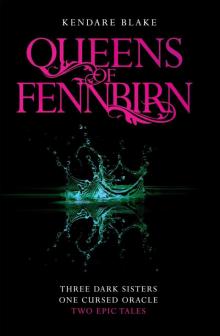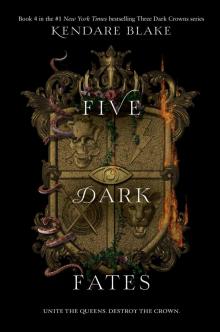- Home
- Kendare Blake
The Young Queens Page 7
The Young Queens Read online
Page 7
“Caragh Milone,” Madrigal says. “What are you up to with this boy?”
“You should keep an eye on your crow,” says Matthew, and Madrigal skips up to and around him. Her long brown hair flicks across his shoulder, and her fingers slide down his arms. Even when she is being a brat, she looks like a fairy. Twirls and sparkle. Gossamer wings.
“I always have an eye on my crow. Just like Caragh has on her dog.” She taps Juniper’s nose and looks back at Matthew. “I remember you. Matthew Sandrin. My how you’ve grown.”
Caragh watches Matthew over her sister’s shoulder. He stares at Madrigal like he hates her, but he still stares. Madrigal has always made everyone stare.
“Should we go home together?” Madrigal asks. “If you can keep up?” She spins away, and the children follow, as if pulled by an unseen leash. Jules does not even look at Caragh. None of them do. They are not their usual, rascal selves.
“Wait, Madrigal,” Caragh says. “You children go on ahead. We’ll catch up to you.” The three of them walk on somberly, and Caragh senses a tension in them. A fear.
“What now?” Madrigal asks, and rolls her eyes.
“What did you do to them? Jules looks ready to wilt flowers.”
“I didn’t do anything to them. We called butterflies and grew grass. Arsinoe grew nothing. She won’t last long, you know, if you keep treating her this way. She will be dead the moment the Quickening is over.”
“You didn’t speak to them of that?”
“Of course not.”
“Madrigal, they are too young. She is not ready.”
Madrigal crosses her arms. It has been more than two years since Arsinoe made any mention of her sisters. The memories have likely faded into nothing. But even if they have, she is still only a little girl. Too young a queen to start in with talk of the killing.
“Why is that your decision to make?” Madrigal narrows her eyes. “You are not Mother. You are not anyone’s mother. And if there is a guardian to the queen, it is clearly meant to be my Jules.” She says nothing else. She turns and walks with light steps onward up the road.
Neither Caragh nor Matthew move until Madrigal is gone. Caragh clenches her fists. She would like to jump up and down and scream.
“She thinks she can come here and upend everything! She arrives, ruins things, and leaves. That is what she does. And she never sees the consequences!”
Matthew slips his arm about her trembling waist.
“You’re still her aunt,” he says. “Jules still loves you. She always will.”
A heaviness forms in her throat as he speaks. She knows that. She knows she is being ungrateful, spurning the idea of being only Juillenne’s aunt after raising her for six years. To want Jules to run to her, not Madrigal, when she calls her first great fish or has a bad dream.
“Go home, Matthew,” Caragh says.
“What? Why?”
“Because that’s the first stupid thing you’ve ever said to me.”
For days and nights, the old tales of the queens haunt Jules’s every moment. She has heard the tales before—brutal, exciting stories of poison and wolves and fire. But they were only stories. Even when Arsinoe came to them and Arsinoe was real, her young mind could not fathom that one day Arsinoe would be a part of one of those stories. Joseph tries to distract her, but not even he can keep her from worrying.
“Your mum was probably fooling about. To scare us. Like around the Reaping Moon fires,” Joseph says. “And even if she wasn’t, Arsinoe’s tough.” He shoves Arsinoe, standing beside him, until she stumbles, to illustrate the point. “I wouldn’t want to fight her.”
But it is not just a fight. Arsinoe and Joseph would rather not know. They would rather forget the silliness that Madrigal said and go back to enjoying their summer. To believe it meant difficulty. It meant things that they were not prepared for.
It meant growing up.
Later that night, when Jules kneels down on the rug beside her grandpa Ellis’s chair, she is not sure what she wants to hear. She only knows she must find out where the truth lies, in all the tales.
“Grandpa,” she says, twisting a bit of the fine yarn he spins around her index finger. “What’s going to happen to Arsinoe?”
He looks down at her through the bottom of his spectacles. Unlike other adults, he does not tell her that it is nothing. He does not lie.
“You have heard something,” he says, “haven’t you?”
“Only thinking about the old stories. The queen stories. And Arsinoe is a queen. Is she a queen like that?”
“You are still young, Jules, and this will be hard for you to understand. But as the Ascension draws nearer, you will hear things. About the contest between the queens. About how they take their crown. The people will start to talk more as Arsinoe grows.”
His tone is calm. The Ascension is nothing new. The deaths of queens are nothing new. Jules feels deeply ashamed suddenly, of her youth and her ignorance. Her inability to understand what was true until now. Even knowing, it seems impossible when all the death she has ever known was the death of animals or of the old. Of fishers lost at sea or folk taken by illness or accident. But death cannot touch Arsinoe, who is young and careful. Who has become her best friend and foster sister.
“She has to?” Jules asks. “Can’t someone else?”
“No. It can only be her. Arsinoe is a queen, Jules. She is special. It is in her nature; you will see. It is her purpose.”
That night, lying in bed with Arsinoe snoring across the room, Jules cannot stop thinking about Grandpa Ellis’s words. Kill or be killed. That is her purpose. Her nature. But that is not fair. That cannot be.
“I will find a way to keep you safe, Arsinoe. I’ll protect you. I promise.”
THE AFTERMATH OF ARSINOE’S ATTEMPT TO ESCAPE
Two Years Later
INDRID DOWN
The foolish little naturalist queen tried to flee. She, a Milone brat, and a Wolf Spring boy were found stranded in the mists, floating in a pitifully small, stolen boat. After they were caught, they were brought under lock and key to the Volroy, along with Cait Milone and her family.
“They have arrived only just now?” Natalia asks as she and Genevieve walk quickly through the castle to the chamber where the trial is to be held. “A shame. They should have been allowed to languish a while in the cells.”
“The council was too eager to punish them,” says Genevieve.
“Then they may be disappointed. We cannot punish the queen. Queens are not to be touched until after the Quickening, and she is still only eleven years old. The island will view it as nothing more than youthful indiscretion.” Some will even admire her rebelliousness. The alliances of the island have begun to shift. Natalia has felt it ever since the elemental queen showed so strong a gift. The poisoners, her family, had ruled Fennbirn well. But they had been in power too long. Three poisoner queens, and it is easy for the island to turn restless.
Natalia and Genevieve climb the stairs and burst through the upper chamber door. The room is vast and open to the east with a railed balcony that overlooks the courtyard and on past the rooftops to Bardon Harbor. Members of her Black Council, which is finally truly hers now and not her mother’s, stand in small groups in their silk handkerchiefs and deep purple skirts. Where once they were all old poisoners—except for her cousin Lucian, and Paola Vend, from the strongest poisoner family in Prynn—now the council is filled with youth: Natalia’s brother Antonin and sister, Genevieve. Her younger cousin Allegra. The vivacious young poisoner Lucian Marlowe.
In the center of the room, pressed to their knees on the red, circular rug, are the naturalist queen and her co-conspirators. They are still children to her eye, though the queen and Juillenne Milone both glare at her with foolishly little fear. Natalia could have the little Milone poisoned. And the boy as well. They have committed a dire offense, and she would so very much like to give them to Katharine as a set to practice on.
As she thinks this, sh
e glances at Juillenne Milone and nearly startles. The girl’s gaze is so intense that she must be able to read Natalia’s thoughts.
“We would speak,” says Cait Milone. It has been a long time since Natalia has seen her, but she seems as hard and proud as ever.
“Then speak,” Natalia says. “Though I do not know what you think you can say.”
Still, she listens as Cait pleads, insofar as Cait is capable of pleading, and turns a sympathetic ear to the tears of the boy’s mother, a woman named Annie Sandrin. Mostly though, she watches. She watches the way the two younger Milone women cling to the backs of chairs but not to each other. She sees the guilt-bent back of Cait’s husband. The confused, pale faces of the Sandrin men as they wonder how their boy got mixed up in a queen’s business.
And she watches the queen. Arsinoe. She has grown long and lanky in the five years since the Black Cottage. Her hair is chopped short, the ends uneven, and she is not a beauty, like her queen Katharine, or like the elemental Queen Mirabella is rumored to be. She is plain, with a stingy, downturned mouth, and the council’s spies in Wolf Spring say her gift has still to show.
To Natalia she looks like an easy kill.
“Natalia?” Genevieve prods her from her reverie. Apparently, the pleading and lamentation is over.
“Will the queen be allowed to speak?” asks Cait.
“It is not necessary to let the children speak,” says Cousin Lucian.
“But I would speak.”
Heads turn as Arsinoe gets to her feet.
“Then of course, Queen Arsinoe,” Natalia says. “We will hear you.”
“None of this was their fault.” Arsinoe gestures to the Milone girl and the dark-haired boy. “It was my idea. I told them to do it. I made them help me.”
Natalia does not believe her for a moment. But she will pretend. It would be perhaps too much to ask of Katharine yet anyway, to poison two children so close to her own age.
“If that is true, then they will not die.” Natalia looks at the two of them, the boy afraid and contrite, and the Milone girl still defiantly scowling. Everything about her screams defiance, except the desperate way she clings to the boy’s hand. “Joseph Sandrin will be banished to the mainland until he comes of age, or we see fit to retrieve him.”
Queen Arsinoe’s mouth falls open, but Juillenne Milone begins to shout, and every Milone in the room presses forward, as if to comfort her.
“She has quite the temper, Cait,” Natalia says. “You look almost frightened!” She raises her chin to Juillenne. “The Milone girl is sentenced to the Black Cottage. She will repay this crime through service as the next Midwife to the crown.”
“No!” Arsinoe and the boy start to cry and throw their arms around Juillenne. One of the younger Milone women slumps into her seat. Another bursts through the barrier of guards, and before Natalia can stop her, attaches herself to her sleeve.
“Please,” she says. “Let me go instead.”
“You should be glad. She could be dead. And there are many priestesses who would be thrilled by such a sentence. It is more honor than she deserves.”
“She is only a child. Have you no mercy? Are the Arrons truly as wicked as that?”
Natalia looks at her council of poisoners. The ill will toward them spreads by the day. So much so that she may have to dismiss some of them and appoint new members of other gifts. A warrior, perhaps. Or even someone giftless. That ought to appease the people.
“Very well,” she says, and sighs. “That will do.”
Katharine runs to greet Natalia the moment she comes through the front door, as she often does when she is not ill from poison training. Natalia stifles a smile and takes her time getting out of her gloves before lifting the cool glass of poison juice from Edmund’s silver tray. Katharine seems about to burst standing there, hands folded and trembling over her black skirt and ankles twisting in an odd little dance.
“Yes, Kat?” Natalia says finally, and Katharine takes her by the hand.
“They tell me something has happened! Something with Queen Arsinoe!”
Genevieve catches Natalia’s eye as she slips past in the foyer. “I will speak to the servants again about gossiping.”
Natalia nods. Katharine’s memories have faded. There is little danger in speaking of Arsinoe, or even Mirabella. They are only names to her now. Rivals. Though they have only discussed it in the broadest terms, Katharine knows that the other queens must be killed, and after five more years of training, and armed with a strong poisoner gift, she will be ready to do it.
“It was not the servants’ fault,” Katharine says quickly. “I was eavesdropping.”
“Eavesdropping,” Genevieve scoffs. “It is more likely that you were just silent for so long they forgot you were there, little mouse. I will speak to them.” She touches Natalia’s arm and leaves. Natalia gave her younger sister a place on the council only recently, but it seems to have centered her. Or at least she does not seem half as frivolous as she did before.
“What did Queen Arsinoe do?” Katharine asks. “They said that she was to be punished. That you were to punish her.”
“She tried to leave the island.”
“But queens are not allowed to leave the island.”
“I do not even think that it was her fault.” Natalia sighs. “Certainly it was not her idea. She was taken in by foolish naturalists. They have never been fit guardians.”
“Not like you.” Katharine looks down. She is so meek. So sweet. They ought to train that meekness out of her, but Natalia cannot bring herself to try. Or perhaps she knows that it would be impossible. Katharine will always be a kind, grateful girl in need of looking after. “So you were merciful, then? If it was not her fault?”
“I was.”
“But you did punish her?”
“I did.” Natalia reaches out and touches the queen’s pale cheek. “I will always take care of everything, Kat. If you are tired, I will be alert. If you are weak, I will become twice as strong. I will guard your crown for you.”
ROLANTH
Queen Mirabella, I have brought you something.” Luca takes down the hood of her light traveling cloak, and the queen sets aside her book and walks quickly into the High Priestess’s open arms. She squeezes the girl tightly and steps back to remove her gloves. Fall has come early to Rolanth, so far in the north, with a chill wind rushing through the evergreens and across the basalt cliffs. In the capital of Indrid Down, from whence she came, they are still enjoying the last of a balmy summer, and the change in climate has made the bones in the High Priestess’s wrists ache. This Rolanth weather will take some getting used to.
“I care only that you have brought yourself,” Mirabella says, and kisses her hands. “But what did you bring me?”
“Iced anise cookies.” Luca holds them up, in a pretty striped box, and Mirabella takes them. She sniffs the edge. “I thought we could have them with our tea. But first, to business. I must tell you what has happened to your sister, Queen Arsinoe.”
Mirabella’s smile fades. They have come a long way from water spirits forced down Luca’s throat. Mirabella is no longer a danger. No longer kept in a basement out of fear. But the queen is stubborn. At least as stubborn as she is strong, and that makes her the most stubborn girl on the island.
“They should have known she would get herself into trouble. They should have guarded her more closely. Do they not know her at all?”
“They know her, and they care for her,” Luca says. “I have seen it.”
Luca takes her arm and walks with her through the open air of Rolanth Temple. As the years passed, she has grown fond of the elemental queen. More than fond. She has grown to love her, and the favoritism shown by the High Priestess cannot be denied. But favoritism by the High Priestess is not the same as favoritism by the temple. So she told Natalia Arron when the woman finally confronted her. She will never forget the look on Natalia’s face when she said she would be leaving Indrid Down to reside in Rolanth with
the queen.
“What was the punishment?” Mirabella asks as they walk past the altar and into the dome with the mural of elemental Queen Elo, the fire breather, where they might hide from the wind. “Was it as bad as you feared?”
“It was not. It was a rare show of Arron mercy. Banishment to the mainland for the boy.” She pauses as Mirabella puts a hand to her throat. “And banishment of another kind for the girl. To the Black Cottage, to serve as the next Midwife. However, it seems that the girl’s aunt will take her place, so Queen Arsinoe may keep her companion.”
Mirabella exhales. After their first meeting on the banks of Starfall Lake, Luca did not know if she could be controlled. But the key to taming Mirabella has been to use a soft hand. Not to try to drive the thoughts of her sisters from her head, but to understand them. To educate her in the ways of a queen and devote her to the Goddess completely. To make her a servant.
Sara Westwood still foolishly hopes that one day Mirabella will forget, like other queens do. But Mirabella will never forget. Perhaps it is because she is such a rare queen, of such tremendous power, and the memories are the way the Goddess has chosen to test her. Or perhaps it is because her sisters were burned into her mind after being locked in a dark basement for three long years.
It will take time, and more education, but Mirabella will be the queen that the island needs. She is chosen. Luca knows that as surely as she has known anything since the day she took the bracelets and entered the temple.
“You are still wild.” Luca reaches out and flicks a long lock of tangled black hair from the queen’s shoulder. “Have you been out in the wind, running along Shannon’s Blackway again, with Bree?”
“Only before prayer this morning. We were both so restless, awaiting your return.”

 Anna Dressed in Blood
Anna Dressed in Blood The Young Queens
The Young Queens Queens of Fennbirn
Queens of Fennbirn Antigoddess
Antigoddess The Dogs of Athens
The Dogs of Athens Ungodly
Ungodly Mortal Gods
Mortal Gods Five Dark Fates
Five Dark Fates Girl of Nightmares
Girl of Nightmares One Dark Throne
One Dark Throne Two Dark Reigns
Two Dark Reigns The Oracle Queen
The Oracle Queen Antigoddess gw-1
Antigoddess gw-1